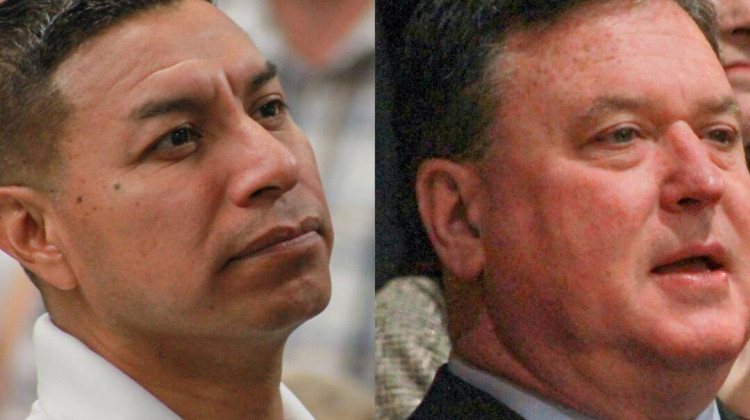
Cell phones that can't be repaired have led to a lot of e-waste and the need to mine more rare earth metals for new phones.
Lauren Chapman/IPB NewsIs it possible to address climate change without also addressing consumerism? A listener in Muncie wanted to know.
It’s no secret that the less stuff you buy, the less energy and materials are needed to make that new product — and that’s good for the climate. There are other kinds of consumption too — like how much electricity we use in our homes or how much gas we use to fuel our cars.
Amrou Awaysheh is the executive director of the Indiana University Business Sustainability and Innovation Lab. He said many businesses have set aggressive goals to lower their carbon emissions and more companies are making consumers aware of what they're doing for the climate.
That means consumers can make a positive impact by "voting with their dollars."
"If they choose to buy products and goods from a company that doesn't care about the environment, or doesn't care where the raw materials are extracted from — then that's on them," Awaysheh said.
READ MORE: Does recycling plastic help with climate change?
Join the conversation and sign up for the Indiana Two-Way. Text "Indiana" to 73224. Your comments and questions in response to our weekly text help us find the answers you need on statewide issues, including this series on climate change and solutions.
Zach Schrank is a sociologist at Indiana University South Bend and teaches classes on the intersection between the environment and consumption. He said there are other things you can do to reduce your impact — like buying things used and sharing items with your neighbors.
But Schrank said just by being in an affluent society like the U.S., we consume more and we don't always have control over that.
"We know that the amount of emissions that come from something like concrete and cement production, or steel production — which is really the kind of the foundation of a modern global economy — whether it's infrastructure from the roads and bridges we use," he said. "But you know, the cars we drive, the materials that we depend upon — those have, across the world, a massive proportion of emissions."
Even on an individual level, we may not always have the opportunity to make greener choices.
If you live outside a major city, you might not be able to go without a car. If your smartphone battery dies, you may not be able to replace it yourself and have to get a whole new phone.
“It is the responsibility of the entities that are making these things and the governments that are regulating the production and sales of these things, so that consumers have good options," he said.
Schrank said individuals will have to work collectively to make that possible — making their voices heard and voting for people who will bring about change.
Awaysheh said while excess consumerism is a bad thing, the idea that you have to severely limit yourself to save the planet isn’t helpful.
“We hurt ourself when we’re talking about climate change and we say, ‘Oh, you got to eliminate everything you've been doing now.’ That's not fair, because people are not going to get on board," he said. "All we're saying is, you need to change some of the ways you've been doing things."
Awaysheh said as people in less wealthy countries enter the middle class, it's also not fair to deny them the right to start using products and services that we often take for granted in the U.S. — like air conditioning.
Contact reporter Rebecca at rthiele@iu.edu or follow her on Twitter at @beckythiele.
Indiana Environmental reporting is supported by the Environmental Resilience Institute, an Indiana University Grand Challenge project developing Indiana-specific projections and informed responses to problems of environmental change.
9(MDAyMzk1MzA4MDE2MjY3OTY1MjM5ZDJjYQ000))
 DONATE
DONATE






 Support WFYI. We can't do it without you.
Support WFYI. We can't do it without you.